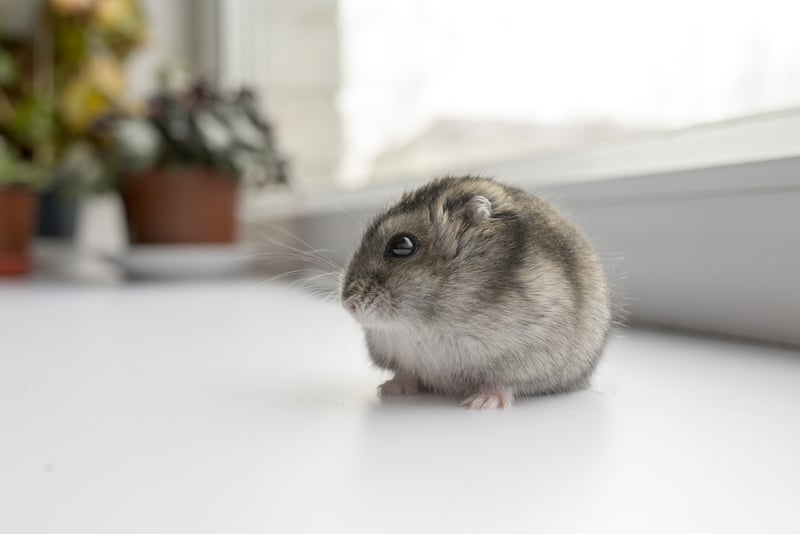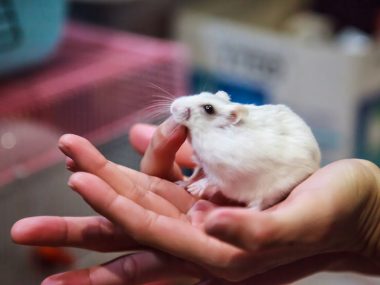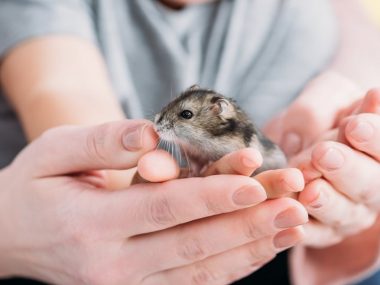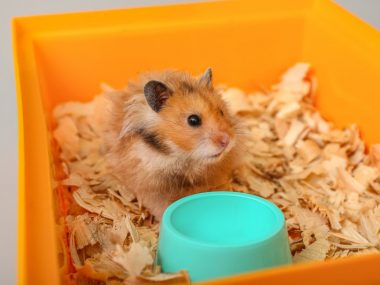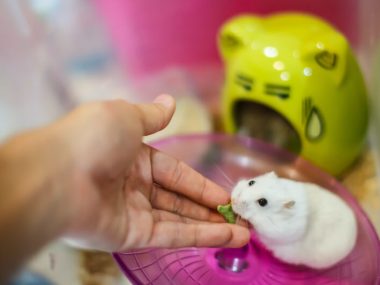Since hamsters are classified as rodents, you may be worried that they carry awful diseases like the bubonic plague. Like all animals, hamsters can transmit a few conditions to their human owners, but they are one of the safest pet options in this regard.
Transmissible hamster diseases include Lymphocytic choriomeningitis and salmonella. Rodent tapeworm and fungal ringworm can be transmitted. Hamsters that are kept in hygienic conditions rarely transmit diseases to humans. Current research is underway regarding hamsters’ susceptibility to Covid-19.
This may seem like a really frightening list, but in reality, it is very rare for a human to get seriously ill from contact with a hamster. Let’s go through the list of possible conditions and how to avoid any chance of infection so you and your hammie can continue to spend stress-free time together.
Table of Contents
Do Hamsters Carry Diseases?
Hamsters are more likely to spread diseases to other hamsters than to pass any along to their human handlers. For this reason, it is vital to quarantine any new hamsters that have joined the family for one to two weeks before letting them meet your established hamsters.
Every veterinarian in the world would be sick if hamster diseases could jump from the animal onto a human! In order to actually develop a disease carried by a hamster, a human must have very close contact or even ingest bacteria directly from the animal.
In almost every disease scenario, so long as hamster owners keep their pets in hygienic conditions and wash their hands properly after handling them, there is virtually no risk of picking up diseases from them. Hamsters are one of the few domestic animals that do not require any compulsory vaccinations.
What Diseases Can Humans Get From Hamsters?
There are two noteworthy diseases that may spread from infected hamsters to humans.
- Salmonella – Hamsters commonly suffer from diarrhea, which is called wet tail. It is an extremely serious condition for your little pet. However, infection of salmonella bacteria in pet hamsters is rare. To develop salmonella, a pet hamster’s bedding or food would have to have been contaminated by salmonella-carrying wild rodents or insects.
To prevent getting salmonella from a hamster, owners simply need to wash their hands after handling the animal, their cages, and bedding. This is especially vital when cleaning the cage and disposing of feces and urine-soaked bedding. - Lymphocytic choriomeningitis (LCM) – According to the American Academy of Pediatrics, LCM is a rare viral infection that mainly affects children. It initially causes flu-like symptoms, and patients later develop additional meningitis-like conditions like stiff neck and confusion. With supportive care, the usual outcome is complete recovery.
According to the CDC, human infections of LCMV almost always occur from mice and very rarely from hamsters. LCMV is caused by inhaling airborne particles of rodent feces, saliva, or urine or ingesting food tainted with specks of urine-infected dust.
Proper pet care habits should be developed from a young age. Young children must be supervised while handling hamsters and while gently loving and cuddling the little pet is delightful, they should be discouraged from kissing them. Kids must be taught to wash their hands with soap after interacting with animals.
Can I Get Covid-19 From My Hamster?
There appears to be a new elephant in the room that hamster owners need to become aware of. However, before anyone starts to panic, it looks like it is a lot more likely that you will infect your socially isolated hamster with Coronavirus than the other way around.
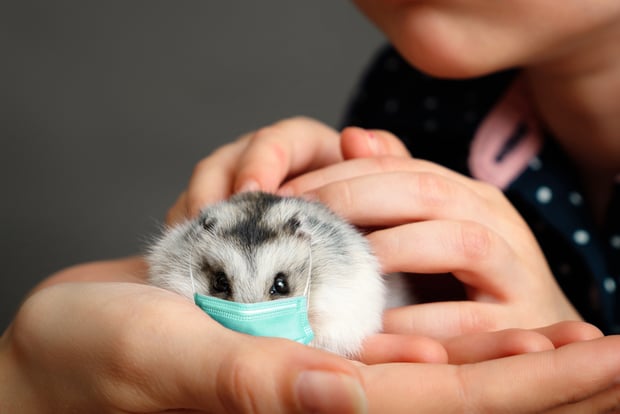
New research is revealing that Golden Syrian hamsters may be particularly susceptible to Coronavirus, and the animals can develop similar pneumonia-like symptoms as humans. There are two key takeaways for pet owners:
- Do not have close contact with any new additions to your hamster family for at least a week – new hammies need a quiet adjustment period anyway to settle into their new environment.
- If you have Coronavirus, avoid close contact with your hamster so it can avoid becoming infected. Consult your veterinarian if you have concerns.
Frequently Asked Questions:
Is It Safe To Have A Hamster As A Pet?
Hamsters are generally considered safe pets. However, these small rodents are not recommended for young children or people with compromised immune systems. While diseases spread from hamsters to humans are rare, there is a slight chance that they may carry salmonella or a viral condition called Lymphocytic Choriomeningitis (LCMV).
Can Hamsters Give You Worms?
Unfortunately, humans can get rodent tapeworms, but this is rare. You would need to ingest tapeworm eggs to become infected.
Rodent tapeworm can be effectively avoided by always washing your hands after handling your hamster. Careful hygiene must also be maintained when cleaning the cage or touching your pet’s bedding.
Humans are far more likely to develop ringworm from handling an infected hamster. Ringworm is not caused by any sort of worm but is a fungal infection that can be treated with an over-the-counter topical antifungal cream. This uncomfortable skin infection is characterized by a crusty circular skin lesion with red edges.
Do Hamster Bites Have Rabies?
It can be pretty scary to be bitten by any animal, even one as small as a hamster. Fortunately, it is highly unlikely that your hamster has rabies. According to the CDC, small rodents are almost never infected with rabies.
Hamsters do occasionally bite humans, but that is usually because they are frightened or in pain. Any bite wounds must be cleaned as bacteria may have penetrated the skin. Immediately wash any puncture wounds with soap and water and if there is any sign of infection, get it checked out by a healthcare professional.
Conclusion
The most common condition that may be transmitted directly from a hamster to a human (and vice versa) is fungal ringworm infection. So long as hamsters are kept in hygienic conditions and owners always wash their hands after handling, the chances of catching a disease from your hammie are extremely low. Young children should always be supervised when playing with small animals and must be taught to wash their hands after each interaction.
